新世纪英语七年级第一学期知识点
七年级上册英语所有知识点
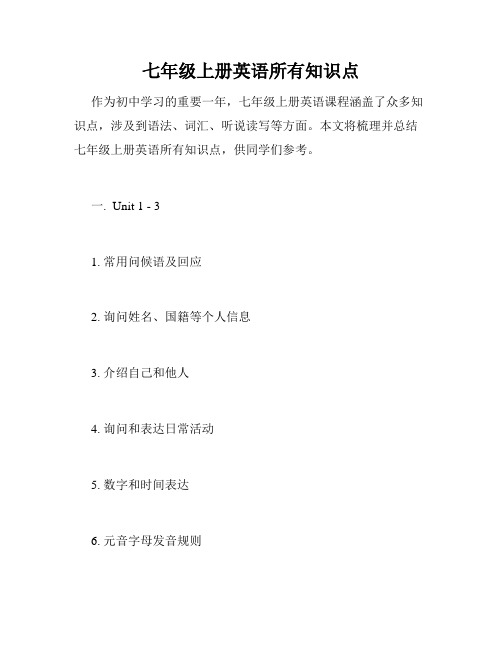
七年级上册英语所有知识点作为初中学习的重要一年,七年级上册英语课程涵盖了众多知识点,涉及到语法、词汇、听说读写等方面。
本文将梳理并总结七年级上册英语所有知识点,供同学们参考。
一. Unit 1 - 31. 常用问候语及回应2. 询问姓名、国籍等个人信息3. 介绍自己和他人4. 询问和表达日常活动5. 数字和时间表达6. 元音字母发音规则二. Unit 41. 行李和空中餐食的描述2. 旅行时遇到的问题和解决方案3. 提建议和定计划4. 初步学习一般现在时三. Unit 5 - 61. 家庭成员及其关系的描述2. 描述家庭环境和住宅3. 询问和描述兴趣爱好4. 表达对事物的喜欢和不喜欢5. 修辞疑问句和限制性从句四. Unit 7 - 81. 学校设施和课程介绍2. 描述日常学习和活动3. 能够通过指路和寻求帮助4. 表达感受和想法五. Unit 9 - 101. 描述人物形象和衣着2. 表达感官体验3. 询问和描述路线和位置4. 表达事件的顺序和时间5. 了解并掌握过去式和过去进行时六. Unit 11 - 121. 描述天气和气候2. 表达在不同天气下的活动3. 声称和否定说法4. 表达和询问意见5. 继续深入过去式的学习七. Unit 13 - 141. 描述城市和交通2. 询问和点餐饮食和购物3. 能够用电话沟通4. 学习虚拟语气和现在完成时八. Unit 151. 描述一些不同寻常的地方和事情2. 学习大写字母和介词3. 理解成功和失败的意义以上就是七年级上册英语所有知识点的总结。
当然,这并不意味着所有内容都是平均重要且涵盖了所有内容。
对于每位学生而言,应该根据自己的情况及学习目标和需求进行合理选择和安排,学习重点内容。
希望同学们都能顺利掌握这些知识点,为更高水平的英语学习打下扎实的基础。
初中英语新世纪版七上U1L3知识梳理修改稿

U1L3 Making our home greener单词短语句型1. plantv.种植=growplant more trees and flowers 种更多树和花 on Tree Planting Day 在植树节 March is the time to . 三月是种树的时节。
n. 植物All water and light. 所有的植物都需要水和阳光。
2. wonderful a 精彩的 a wonderful season 一个极好的季节 ● I had a ___________time yesterday. ● I _________what will happen next. ● He plays basket ball __________.● The Great Wall is at the top of "Seven New World .wonderfully adv. 惊人地 play the piano wonderfully 钢琴弹得好wonderv. 想知道= want to known . 奇迹; 惊奇 seven wonders 七大奇迹 no wonder 难怪3. happenvi. 发生;sth. happen (to sb/sth). (某人/某物)发生了......Something happened to the train/her. What's happening?=What's going on? vi. 碰巧sb. happen to do sth. 某人碰巧做某事 I happened to see her yesterday.make our city greener 使我们的城市更绿 go to the same place 去同一个地方 look after = take care of 照看,照顾 be a few minutes late 迟到几分钟set out (for sp.)= set off (for sp.)=leave(for sp.) 出发(去某地)look after sb. well = take good care of sb. 好好照顾某人 a few minutes later 几分钟后4. dig 过去式: dug v. 挖掘 现分: digging dig up 挖出dig a hole 挖一个洞5. enougha. 足够的 enough green area s 足够的绿地ad. 足够地 warm enough 足够温暖n. 足够No, thanks. I have had .谢谢,我饱了 6. knock v. 敲knock a long strong stick into the earth 把一根长而结实的木棍敲进泥土 knock at the door 敲门 knock sb. down 撞倒某人n. 敲门声Did you hear the knocks at the door ? 6. strong a. 强壮的 a strong man 一个强壮的男人 She didn't even have the to stand up. 她连站起来的力气都没有了 strength n. 力量8. earth n. 泥土; 地球 the earth in the garden 花园里的泥土 on the earth 在地球上9. step 过去式: ste pp ed vi. 踩,踏step on the earth sereral times 踩几下土 ● We heard foot ___________ outside. ● Did I ___________ on your foot? 我踩了你的脚吗? n. 脚步;脚步声 watch your steps 留心脚下 step by step 逐步地10. tie 现分: tying vt. 系,捆扎 tie the tree to the top of the stick把树捆扎到木棍的顶端n. 领带 a blue tie 一条蓝色的领带11. top n. 顶端,上部 at the top of ... 在...顶部on the top of 在...之上He is the top student in our class.=He is _______ _______student in our class. a. 居首位的 the top = the best 最好12. water n. 水u much water 许多水vt. 给...浇水 water the tree 给树浇水13. build vt. 建造 build more high-rises 建更多高楼rebuild 重建 rebuild our home 重建家园 building n. 建筑 two blue buildings 两幢蓝色的大楼 buildern. 建立者 two builders 两个建造者 14. air conditioner n.空调机air conditioned a.装有空调 的语法知识的归纳The simple future tense 一般将来时 1. 用法:表示将来发生的动作或状态。
七年级上册英语一到三单元知识点

七年级上册英语一到三单元知识点Unit 1 My name's Gina.一、重点单词。
1. name.- 名词,意为“名字;名称”。
例如:My name is Tom.(我的名字是汤姆。
)2. nice.- 形容词,意为“令人愉快的;宜人的”。
常用来形容人或事物给人的感觉。
例如:She is a nice girl.(她是一个友好的女孩。
)3. to.- 介词,在这里主要用于“Nice to meet you.”(很高兴见到你。
)这一常用表达中。
4. meet.- 动词,意为“遇见;相逢”。
例如:I meet my friend at the park.(我在公园遇见我的朋友。
)5. too.- 副词,意为“也;又;太”。
在表示“也”的用法时,一般用于肯定句末。
例如:I'm fine, too.(我也很好。
)6. your.- 形容词性物主代词,意为“你的;你们的”,后面要接名词。
例如:Your book is on the desk.(你的书在桌子上。
)7. his.- 形容词性物主代词,意为“他的”。
例如:His name is Jack.(他的名字是杰克。
)8. her.- 形容词性物主代词,意为“她的”。
例如:Her pen is red.(她的钢笔是红色的。
)二、重点短语。
1. name's = name is.- 这是一种缩写形式,在口语和书面语中都很常见。
例如:My name's Lucy.(我的名字是露西。
)2. be from.- 意为“来自”,相当于come from。
例如:He is from China.(他来自中国。
)3. Nice to meet you.- 用于初次见面时打招呼,答语通常是“Nice to meet you, too.”三、重点句型。
1. —What's your name?- 这是用来询问对方名字的常用句型,答语可以是“My name is...”或者“I'm...”。
初一上英语知识点归纳总结
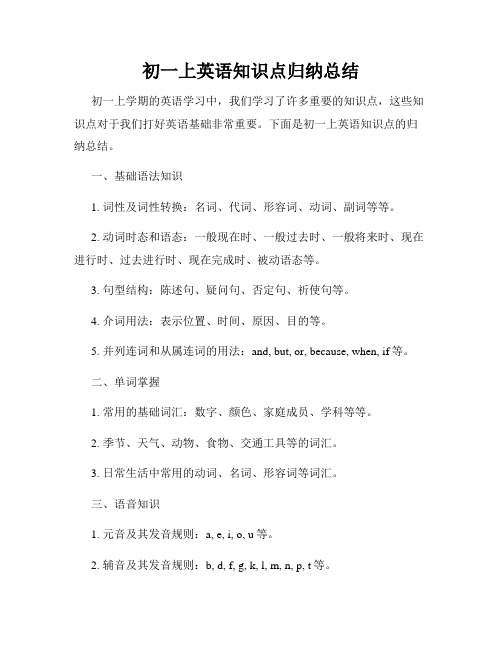
初一上英语知识点归纳总结初一上学期的英语学习中,我们学习了许多重要的知识点,这些知识点对于我们打好英语基础非常重要。
下面是初一上英语知识点的归纳总结。
一、基础语法知识1. 词性及词性转换:名词、代词、形容词、动词、副词等等。
2. 动词时态和语态:一般现在时、一般过去时、一般将来时、现在进行时、过去进行时、现在完成时、被动语态等。
3. 句型结构:陈述句、疑问句、否定句、祈使句等。
4. 介词用法:表示位置、时间、原因、目的等。
5. 并列连词和从属连词的用法:and, but, or, because, when, if等。
二、单词掌握1. 常用的基础词汇:数字、颜色、家庭成员、学科等等。
2. 季节、天气、动物、食物、交通工具等的词汇。
3. 日常生活中常用的动词、名词、形容词等词汇。
三、语音知识1. 元音及其发音规则:a, e, i, o, u等。
2. 辅音及其发音规则:b, d, f, g, k, l, m, n, p, t等。
3. 重读音节及音调变化规则。
四、阅读理解技巧1. 阅读理解题的解题技巧:如寻找关键词、注意词义辨析、推断作者意图等。
2. 阅读短文时的速读和细读技巧。
五、写作技巧1. 基础句型的运用:主语+谓语、主语+谓语+宾语、主语+谓语+宾语+宾语补足语等。
2. 描述事物、人物、地点等的写作技巧。
3. 书写规范:大小写、标点符号的运用。
六、听力技巧1. 听力材料中出现的常用词汇和句型。
2. 注意听说者的语气、语调和重要信息。
七、口语表达1. 询问和提供信息的常用表达方式。
2. 描述事情发生的时间、地点和原因等。
八、文化与背景知识1. 国家、地区、民族和语言的名称及相关知识。
2. 英语国家的地理、风俗习惯等文化背景。
初一上英语知识点的归纳总结到此结束。
通过对这些知识点的学习和掌握,我们能够在英语学习中更加自信和熟练。
希望大家能够持续努力,不断提高自己的英语水平。
新世纪版初中七年级英语常用语法知识——非谓语动词知识点总结(含解析)
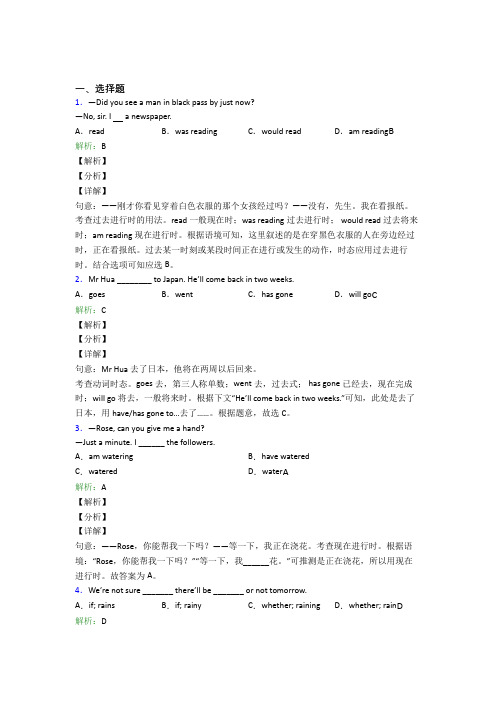
一、选择题1.—Did you see a man in black pass by just now?—No, sir. I a newspaper.A.read B.was reading C.would read D.am reading B解析:B【解析】【分析】【详解】句意:——刚才你看见穿着白色衣服的那个女孩经过吗?——没有,先生。
我在看报纸。
考查过去进行时的用法。
read一般现在时;was reading过去进行时; would read过去将来时;am reading现在进行时。
根据语境可知,这里叙述的是在穿黑色衣服的人在旁边经过时,正在看报纸。
过去某一时刻或某段时间正在进行或发生的动作,时态应用过去进行时。
结合选项可知应选B。
2.Mr Hua ________ to Japan. He’ll come back in two weeks.A.goes B.went C.has gone D.will go C解析:C【解析】【分析】【详解】句意:Mr Hua 去了日本,他将在两周以后回来。
考查动词时态。
goes去,第三人称单数;went去,过去式; has gone已经去,现在完成时;will go将去,一般将来时。
根据下文“He’ll come back in two weeks.”可知,此处是去了日本,用have/has gone to…去了……。
根据题意,故选C。
3.—Rose, can you give me a hand?—Just a minute. I ______ the followers.A.am watering B.have wateredC.watered D.water A解析:A【解析】【分析】【详解】句意:——Rose,你能帮我一下吗?——等一下,我正在浇花。
考查现在进行时。
根据语境:“Rose,你能帮我一下吗?”“等一下,我______花。
”可推测是正在浇花,所以用现在进行时。
七年级上册英语必会知识点
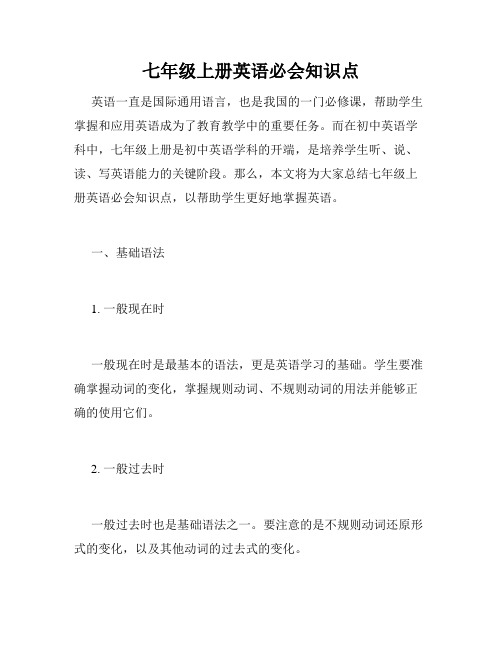
七年级上册英语必会知识点英语一直是国际通用语言,也是我国的一门必修课,帮助学生掌握和应用英语成为了教育教学中的重要任务。
而在初中英语学科中,七年级上册是初中英语学科的开端,是培养学生听、说、读、写英语能力的关键阶段。
那么,本文将为大家总结七年级上册英语必会知识点,以帮助学生更好地掌握英语。
一、基础语法1. 一般现在时一般现在时是最基本的语法,更是英语学习的基础。
学生要准确掌握动词的变化,掌握规则动词、不规则动词的用法并能够正确的使用它们。
2. 一般过去时一般过去时也是基础语法之一。
要注意的是不规则动词还原形式的变化,以及其他动词的过去式的变化。
3. 句型结构学生要学会基本的句型结构,包括肯定句、否定句、疑问句等,并正确运用。
4. 形容词、副词的用法形容词、副词的用法要掌握清楚。
形容词主要用于描述名词,副词用于描述动词、形容词或其他副词。
二、词汇1. 常用单词学生要掌握基本的单词,如数字、颜色、时间等。
同时要学会常用的词汇,如家庭成员、食品以及衣服等。
2. 词汇拓展除了常用的单词外,学生还要学习词汇的拓展,如动词的变化形式、名词的复数形式等等。
三、阅读与写作1. 阅读理解学生要提高阅读能力,包括阅读速度、文章意思的理解等。
建议学生可以多读一些英文童话、故事或小说来提高阅读理解能力。
2. 书写能力学生要掌握正确的书写方式,并能够写出简短的文章,如自我介绍、我的家人、我的学校等。
四、口语表达1. 口语练习学生要多加练习,提高口语表达能力。
建议学生可以多说一些日常生活中的问答,如问候语、身份介绍等。
2. 发音准确学生要注意发音准确,尤其是英语中的元音、辅音、语调等,同时也要注意语音的良好习惯。
在学习英语的过程中,学生要坚持不懈地学习,多加练习,克服难点和困难,同时还要培养良好的英语学习习惯。
相信只要按照以上的七年级上册英语必会知识点来进行学习,学生们定能在英语学习中取得优异的成绩。
初中英语新世纪版七上U1L1知识梳理修改稿
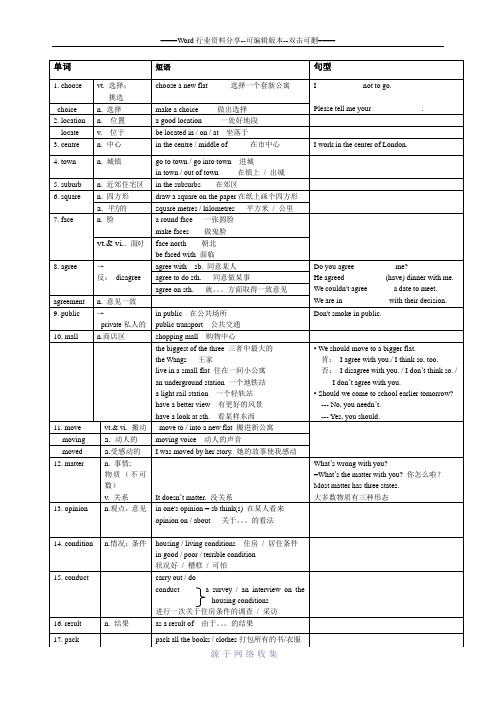
语法知识的归纳1. need 的用法:1)当need作为行为动词后跟sth.或to do sth.。
否定:We ________________buy a bigger flat.▪ He ______________ more money.否定:He ___________________ more money.2. should的用法should是情态动词,是shall的过去形式,构成复合谓语,表示“应当”做某事。
should没有人称和数的变化,后跟动词原形。
否定形式是should not可缩略为shouldn’t。
用should提问时,肯定回答用should,否定回答用needn’t。
3. should 与must的区别should 与must有所不同,must强调说话者强硬的语气,而should则更强调的是一种义务或社会赋予的责任。
Exercise:Fill in the blanks with may, need, should in their proper forms.1. She is ill at home. I think you ________ help her with her lessons later.2. A: _________ I buy film tickets for you?B: No, you ___________.3. A: _________ I ask for leave the day after tomorrow?B: Yes, you ___________.4. A: Linda, you’re poor at maths. You _________ study harder.B: OK. I’ll do my best.5. You __________ not talk in class and you _________ listen carefully.6. A: __________ I return the book to you today?B: No, you _________. You __________ keep it till tomorrow.7. A: ___________ we do more healthy reading after school?B: Yes, you ____________.8. A: ___________ I borrow this book?B: I’m afraid you ___________. There is only one copy in the library.Key:1. should2. Should, needn’t3. May, may4. should5. should, should6. Should, need n’t, may7. Should, should8. May, may not。
上海市新世纪英语七年级(上)知识点大全
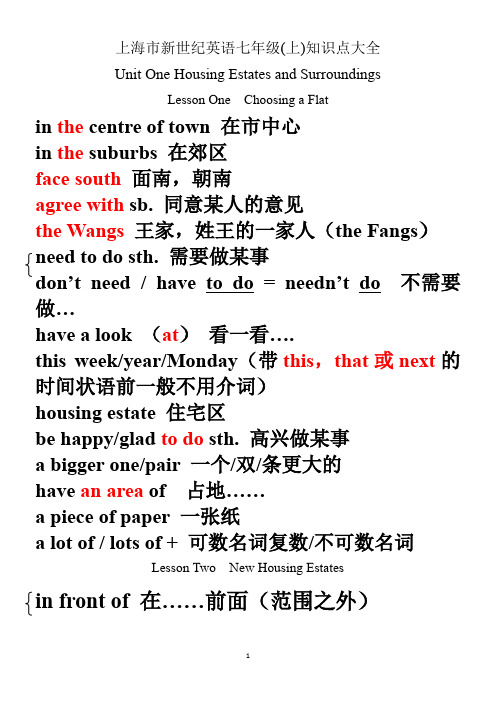
上海市新世纪英语七年级(上)知识点大全Unit One Housing Estates and SurroundingsLesson One Choosing a Flatin the centre of town 在市中心in the suburbs 在郊区face south面南,朝南agree with sb. 同意某人的意见the Wangs 王家,姓王的一家人(the Fangs)need to do sth. 需要做某事d on’t need/ have to do = needn’t do 不需要做…have a look (at)看一看….this week/year/Monday(带this,that或next的时间状语前一般不用介词)housing estate 住宅区be happy/glad to do sth. 高兴做某事a bigger one/pair 一个/双/条更大的have an area of 占地……a piece of paper 一张纸a lot of / lots of + 可数名词复数/不可数名词Lesson Two New Housing Estatesin front of 在……前面(范围之外)in the front of 在……前面(范围之内)ten minute s’ walk 十分钟的步行路程by the way 顺便问一下go to…by bike = ride a bike to…骑车去……go to…by bus = take a bus to…坐公车去……go to…by air = fly to…乘飞机去……return to… = go/come back to…返回……= give …back to归还……给There used to be…过去有There is going to be…/There will be…将会有lose one’s way = get lost迷路used to do sth. 过去常常做某事did’t use to do sth. / u sedn’t to do sth.(否定句形式)Did…use to do sth. (一般疑问句形式)be used to doing sth. 习惯于做某事(to是介词)be used to do sth. = be used to do sth. 被用来做某事What’s…like? = How is…? ……怎么样?语法:(Lesson Three)一般将来时构成shall + 动词原形(只用于第一人称)will + 动词原形be going to + 动词原Lesson Three Making Our Home GreenerOn Tree Plant ing Day 植树节l ook after…well = take good care of…照顾好……set out 出发,启程do a project (on sth.)做(某方面的)课题enough + 名词(to do)形容词/副词+ enough (to do)What’s happening?发生什么事?/怎么啦?What happened to…?……发生什么事?make sb./sth. + 形容词使……变得make sb. do sth. 使某人做某事be made to do sth. 被迫做某事join, take part in, join in, attend 的用法比较join 参加,加入(军队、组织、党派、团体、俱乐部等)和某人一道做某事join sb. in (doing) sth.例如:Would you like to join us?join in 参加(参加小规模的活动如游戏、比赛等,常用在口语中)take part in 参加(会议或群众性的活动等,强调主语在其中发挥的作用)attend 正式用语,指参加会议、婚礼、典礼、葬礼、上课、听报告等,自己去听去看,不一定起积极作用be a member of…成为……的一员(延续性)cut down 砍倒at will 任意地stop sb. to do sth. 停下来做某事stop sb. doing sth. 停止做某事stop sb. (from) doing sth. 阻止某人做某事=keep/ prevent sb. from doing sth.Unit Two Holidays and FestivalsLesson One National Holidayson the morning/afternoon/evening of……在……的上午in the morning/afternoon/evening 在上午(在有具体日期或其他修饰语时,morning,afternoon和evening等前用介词on,无修饰语时用in)What/Who/Where else… (else常和疑问词和不定代词连用)something/anything/nothing/someone elsego sightseeing 去观光call on 拜访;号召;要(学生)回答问题call sb. on + 电话号码打……联系某人get together 召集;团聚ever since then 从那时起invit e(动词)---invit a tion(名词)invite sb. to do sth. 邀请某人做某事Teacher s’ Day 教师节Children’s Day 儿童节Wom e n’s Day 妇女节have a good time = enjoy oneself = have fun 玩得愉快plan to do sth. 计划做某事sometimes 有时some times 几次sometime 某时some time 一些时间,一段时间Lesson Two Festivals in Chinaset off 使爆炸;放(爆竹、鞭炮等);出发;动身;开始(做某事)chat with和……聊天need 的用法:可用作名词,及物动词和情态动词1.need to do sth.例如:Do you need any help? He doesn’t need to do the cooking.2.情态动词主要用于否定句和疑问句中,后面接省略to的动词不定式例如:You needn’t worry about that. He needn’t go now.A:Need I finish the work today?B:Yes , you must. / No, you needn’t.3.needn’t do sth. = don’t need to do sth. = don’t have to do sth. 不需要做某事A:Must I finish the work today?B:Yes, you must. / No, you needn’t.What a shame! = What a pity! 真可惜!like…best 最喜欢…… = favouritestart with以……开始end with以……结束lucky money 压岁钱;红包luck---lucky---luckily---unlucky---unluckilythe dead 已故的人(the + 形容词,表示某一类人)be interested in doing对……感兴趣What’s the date today? 今天几号?What day is it today? 今天是星期几?play games 做游戏Lesson Three Christmastry on 试穿(代词放在中间)try to do sth. 努力做某事try doing sth. 试着做某事try /do one’s best to do sth. 尽力做某事chang ing room = fit ting room 试衣室(at)20 per cent off 打八折give sb. a discount给某人打折size large / large size 大号in asize small / small size 小号size medium 中号size 15 15号what size …at the end of…在……尽头/结尾in the end 最后= at last = finallybring sb. sth. = bring sth. to sb. 把某物带给某人and so on 等等go to bed 就寝,睡觉keep fit / healthy 保持健康the same size as… = A is as big as B.语法:反意疑问句(前肯后否,前否后肯)Let’s… , shall we?祈使句的反意疑问句都用will you?例如:They had a wonderful time here, didn’t they?Yes, they did. / No, they didn’t.The boys aren’t playing football, are they? Yes, they are. / No, they aren’t.Please open the door, will you?Don’t play computer games, will you?Unit Three Going on HolidayLesson One Planning for a Holidayleave for 离开去……leave…for…离开……去……a trip to…一次去……的旅行plan for 为……计划a friend of mine 我的一个朋友at weekends 在周末on weekdays 在作日help sb. to do sth. 帮助某人做某事help sb. with sth.places of interest 名胜show great interest in 对……很感兴趣= be interested inone of + the + 形容词(最高级) + 名词(复数)attend a class 上课语法:人称代词和物主代词人称代词主格在句中作主语;宾格在句中用作动词或介词的宾语;形容词性物主代词通常作定语修饰名词,后面常接一个名词;名词性物主代词在句中作主语、表语、和表语,后面不可以再接名词。
- 1、下载文档前请自行甄别文档内容的完整性,平台不提供额外的编辑、内容补充、找答案等附加服务。
- 2、"仅部分预览"的文档,不可在线预览部分如存在完整性等问题,可反馈申请退款(可完整预览的文档不适用该条件!)。
- 3、如文档侵犯您的权益,请联系客服反馈,我们会尽快为您处理(人工客服工作时间:9:00-18:30)。
新世纪英语七年级第一学期知识点Unit One Housing Estates and SurroundingsLesson One Choosing a Flatin the centre of town 在市中心in the suburbs 在郊区face south 面南,朝南agree with sb. 同意某人的意见the Wangs 王家,姓王的一家人(the Fangs)need to do sth. 需要做某事don’t need / have to do = need n’t do 不需要做…have a look (at)看一看….this week/year/Monday(带this,that或next的时间状语前一般不用介词)housing estate 住宅区be happy/glad to do sth. 高兴做某事a bigger one/pair 一个/双/条更大的have an area of 占地……a piece of paper 一张纸a lot of / lots of + 可数名词复数/不可数名词Lesson Two New Housing Estates in front of 在……前面(范围之外)in the front of 在……前面(范围之内)ten minutes’ walk 十分钟的步行路程by the way 顺便问一下go to…by bike = ride a bike to… 骑车去……go to…by bus = take a bus to… 坐公车去……go to…by air = fly to… 乘飞机去……return to… = go/come back to… 返回……= give …back to 归还……给There used to be… 过去有There is going to be…/There will be… 将会有lose one’s way = get lost 迷路used to do sth. 过去常常做某事did’t use to do sth. / usedn’t to do sth. (否定句形式)Did…use to do sth. (一般疑问句形式)be used to doing sth. 习惯于做某事(to是介词)be used to do sth. = be used to do sth. 被用来做某事What’s…like? = How is…? ……怎么样?语法:(Lesson Three)一般将来时构成shall + 动词原形(只用于第一人称)will + 动词原形be going to + 动词原形Lesson Three Making Our Home GreenerTree Planting Day 植树节look after…well = take good care of… 照顾好……set out 出发,启程do a project (on sth.)做(某方面的)课题enough + 名词(to do)形容词/副词+ enough (to do)What’s happening? 发生什么事?/怎么啦?What happened to…? ……发生什么事?make sb./sth. + 形容词使……变得make sb. do sth. 使某人做某事be made to do sth. 被迫做某事join, take part in, join in, attend 的用法比较join 参加,加入(军队、组织、党派、团体、俱乐部等)和某人一道做某事join sb. in (doing) sth.例如:Would you like to join us?join in 参加(参加小规模的活动如游戏、比赛等,常用在口语中)take part in 参加(会议或群众性的活动等,强调主语在其中发挥的作用)attend 正式用语,指参加会议、婚礼、典礼、葬礼、上课、听报告等,自己去听去看,不一定起积极作用be a member of… 成为……的一员(延续性)cut down 砍倒at will 任意地stop sb. to do sth. 停下来做某事stop sb. doing sth. 停止做某事stop sb. from doing sth. 阻止某人做某事=keep/ prevent sb. from doing sth.Unit Two Holidays and FestivalsLesson One National Holidayson the morning/afternoon/evening of…… 在……的上午in the morning/afternoon/evening 在上午(在有具体日期或其他修饰语时,morning,afternoon和evening等前用介词on,无修饰语时用in)What/Who/Where else… (else常和疑问词和不定代词连用)something/anything/nothing/someone elsego sightseeing 去观光call on 拜访;号召;要(学生)回答问题call sb. on + 电话号码打……联系某人get together 召集;团聚ever since then 从那时起invite(动词)---invitation(名词)invite sb. to do sth. 邀请某人做某事Teachers’ Day 教师节Children’s Day 儿童节Women’s Day 妇女节have a good time = enjoy oneself = have fun 玩得愉快plan to do sth. 计划做某事sometimes 有时some times 几次sometime 某时some time 一些时间,一段时间Lesson Two Festivals in Chinaset off 使爆炸;放(爆竹、鞭炮等);出发;动身;开始(做某事)chat with 和……聊天need 的用法:可用作名词,及物动词和情态动词1.need to do sth.例如:Do you need any help? He doesn’t need to do the cooking.2.情态动词主要用于否定句和疑问句中,后面接省略to的动词不定式例如:You needn’t worry about that. He needn’t go now.A:Need I finish the work today?B:Yes , you must. / No, you needn’t.3.sth. = don’t have to do sth. 不需要做某事A:Must I finish the work today?B:Yes, you must. / No, you needn’t.What a shame! = What a pity! 真可惜!like…best 最喜欢…… = favouritestart with 以……开始end with 以……结束lucky money 压岁钱;红包luck---lucky---luckily---unlucky---unluckilythe dead 已故的人(the + 形容词,表示某一类人)be interested in 对……感兴趣What’s the date today? 今天几号?What day is it today? 今天是星期几?play games 做游戏Lesson Three Christmastry on 试穿(代词放在中间)try to do sth. 努力做某事try doing sth. 试着做某事try /do one’s best to do sth. 尽力做某事changing room = fitting room 试衣室(at)20 per cent off 打八折give sb. a discount 给某人打折size large / large size 大号size small / small size 小号size medium 中号size 15 15号at the end of… 在……尽头/结尾in the end 最后= at last = finallybring sb. sth. = bring sth. to sb. 把某物带给某人and so on 等等go to bed 就寝,睡觉keep fit / healthy 保持健康the same size as… = A is as big as B.语法:反意疑问句(前肯后否,前否后肯)Let’s… , shall we?祈使句的反意疑问句都用will you?例如:They had a wonderful time here, didn’t they?Yes, they did. / No, they didn’t.The boys aren’t playing football, are they?Yes, they are. / No, they aren’t.Please open the door, will you?Don’t play computer games, will you?Unit Three Going on HolidayLesson One Planning for a Holiday leave for 离开去……leave…for… 离开……去……a trip to… 一次去……的旅行plan for 为……计划a friend of mine 我的一个朋友at weekends 在周末on weekdays 在作日help sb. to do sth. 帮助某人做某事help sb. with sth.places of interest 名胜show great interest in 对……很感兴趣= be interested inone of + the + 形容词(最高级) + 名词(复数)attend a class 上课语法:人称代词和物主代词人称代词主格在句中作主语;宾格在句中用作动词或介词的宾语;形容词性物主代词通常作定语修饰名词,后面常接一个名词;名词性物主代词在句中作主语、表语、和表语,后面不可以再接名词。
Lesson Two Booking a Package Tour to Beijing a four-day trip 四日游three-star holiday 三星级宾馆How much do / does … cost?= How much are / is … ? ……多少钱?hold on 等一会,不挂断admission ticket 入场券,门票have sb. do sth. 邀请或叫某人做某事tour旅游,观光(动词或名词)---tourist旅游者,观光者(名词);旅行的,观光的(形容词)---tourism旅游业,观光业(名词)arrive in(大)/at(小)= get to= reach 到达and so on 等等be far from 远离……look forward to 期望,盼望(+ doing sth.)be both/all 都是My parents are both teachers.far---farther---farthest (距离)---further更多的,更进一步的---furthest (程度)语法:并列句or / and / but / foror 或者,否则(表选择)and 并且(表并列)but 但是(表转折)for 因为(表原因)Lesson Two Introducing Shanghai say sth. in English 有英语说某事in English / Chinese / Japanese 用英语chat with 和……聊天in the east of… 在……的东边What’s the population of…? ……的人口是多少?more than = over 超过,多于besides 除了(包括在内)except 除了(不包括在内)travel around 到处游览,周游travel around the world 周游世界has a long history 有着很长的历史show sb. around … 带领某人参观……at night 在晚上in the day 在白天tourist’s guide 导游图;旅游指南tourist attraction 旅游胜地hope to do sth. 希望做某事wish(sb. )to do sth. 希望(某人)做某事be friendly to… 对……友好safe and sound 安然无恙;一切平安safe(形容词)---safety(名词)---safely(副词)northnorthwest northeastwest eastsouthwest southeastsouthUnit Four Popular StoriesLesson One Snow White and the Seven Dwarfs on the wall 在墙上in the walltell sb. (not) to do sth. 告诉某人(不)做某事take sb. to… 带某人去……take out 取出alone 单独,独自= by oneself = on one’s o wnlonely 孤独的on and on 继续不断地,不停地a little house / baby 一个小房子/孩子a little water 一点儿水one after another 一个接一个地,连接地wake up 醒来;叫醒from then on 从那时起have no + 可数名词(复数)/ 不可数名词“没有……”die(动词)---death(名词)---dead(形容词)---dying(现在分词)at once 立刻,马上a few days later 几天后happen to 碰巧say to oneself 自言自语decide to do sth. 决定做某事such + a / an + 形容词+ 可数名词= so + 形容词+ a / an + 可数名词只用such:such + 形容词+ 不可数名词/ 可数名词(复数)只用so:so + many / much / few / little …+ 名词Lesson Two What’s Your Favourite Book? have been to 去了某处,表示还在那里或在往返的路上have gone to 去过某处,表示现在已经不在那里了have been in 已经在某处,表示现在还在那里any other + 名词单数the other + 名词复数How do you like…? 你觉得……怎么样?=What do you think of…?like … better than … 比起……来,更喜欢……=prefer … to …=would rather … than … 宁愿……,而不愿……a lot of = lots of 许多,大量(修饰复数名词或不可数名词)go ahead 进行,开始invite sb. to do sth. 邀请某人做某事invite sb. to… 邀请某人去……make friends with 和……交朋友try to do sth. 努力做某事try doing sth. 试着做某事manage to do sth. 设法做某事true(形容词)---truth(名词)---truly(副词)hard a.困难的;硬的 a hard life hard workad.努力地;艰苦地;猛烈地work hard rain hard/heavily hardly ad. 几乎不be surprised to do sth. 惊讶地做某事go on doing sth. 继续做某事go on to do sth. 继续做某事。
